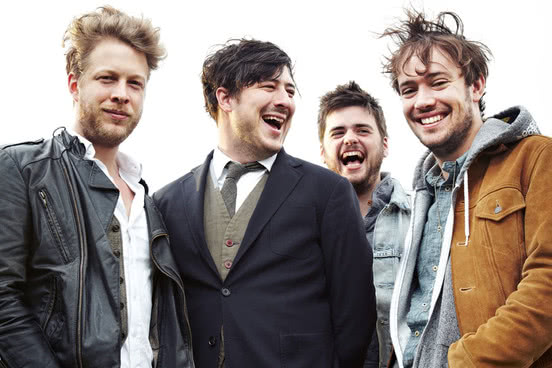“I have this recurring nightmare,” explains Mumford & Sons keyboardist, Ben Lovett, “that we walk out here and nobody knows who we are.” A fear that seems to ring true for a few crude audience members, who yell out obscenities as the musicians of UK’s Mumford & Sons attempt to talk to the crowd between songs.
Seemingly undeterred by this, the impressive vigour of the recorded tracks pale in comparison to the heated intensity of watching Mumford & Sons live.
The first act of the night, Willy Mason, stood alone on the all-too-big stage surrounded by an array of unused instruments and microphones. Flashing cameras, bright against the darkness, began to illuminate the stage sporadically as Mason’s country-style vocals slid smoothly through the speakers and trickled across the audience.
Mason’s heavy lyrics, heated with a soulful clarity, barrelled through the crowd, drenched in bluesy accents and crushing sincerity. Already, the growing audience was beginning to shiver with excitement for the night.
Alex Ebert, frontman of Edward Sharpe and the Magnetic Zeros, bowed low as he walked into view, followed by a league of whimsical band members. The twelve quaintly dressed musicians pranced around the stage as they fell into their respective positions. Starting with “40 Day Dream”, the incredibly high calibre of talent showcased within this band is immediately obvious.
Their dizzying enthusiasm, as Ebert danced, spun, and fell wildly across the stage, constantly trailed by the easy smile and charming grace of vocalist Jade Castrinos, added an energetic charisma to the brilliance of their set.
Ebert’s strong voice resonated through the venue and his enchanting harmonies with the other members sunk warmly into each song. Ending their set with “Home”, the twelve-strong lineup danced eagerly as the music built around their earthy figures and followed them off stage.
Lit solely by glowing blue satellites hanging in the shape of an eye, the musicians of Mumford & Sons weaved their way through the instruments and onto the stage to roaring excitement. Beginning the set with the reflective track “Lovers’ Eyes”, the stage burned colours and silhouetted the musicians in blue, in red, in yellow, and in white, respectively.
Golden discs of light dribbled down the speakers and an arch of artificial candlelight flickered vividly against the dull-lit stage as Mumford & Sons began an intimate a cappella version of “Timshel”. Singing their heartbreakingly desperate harmonies, rich with emotion and candour, without the aid of microphones, Mumford & Sons softly drew on the raw, gospel-influenced sound of the song.
Explaining that Willy Mason is one of their heroes and joking that Edward Sharpe and The Magnetic Zeros are “utter shit, all fifty-six of them, and we love them to pieces” acted as an introduction to “I Will Wait”. An explosion of LCD screens and feverish excitement ensued as the first chords were strummed, and this excitement was replicated in the musicians’ relentless energy that would build and fall with the rhythm of the beat-driven track.
The ethereal vulnerability of their set reached a climax when playing “Little Lion Man”. The entire venue was suddenly lit with stunning lights that were draped across the ceiling, and the tenderness of this morphine-soaked atmosphere was drawn to life once again when “The Cave” was played as an encore.
Both songs elicited the same frantic response in the audience, and the gritty, honest manner in which they were performed was grippingly heartfelt.
Lovett, crumbling over his keyboard, grinned uncontrollably as he danced with the musicians and his respective instrument. This enthusiasm was also apparent in the maniacally passionate Country Winston and Ted Dwayne, the other half of Mumford & Sons, throughout each new song.
Marcus Mumford himself, with his singing bordering on howling, viciously cried the lyrics out over the smouldering crowd as a burning desire saturated the tenor of his voice. With his drawling accent leaking through each line, cracking under the heat of key words, Mumford vivified the intensity of the band’s bluegrass style with effortless expertise.




































